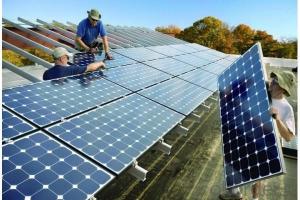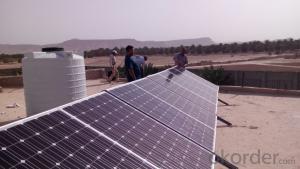Off-Grid Solar Power System 2KW High Efficiency
- Loading Port:
- China main port
- Payment Terms:
- TT OR LC
- Min Order Qty:
- 1 pc
- Supply Capability:
- 10000 pc/month
OKorder Service Pledge
OKorder Financial Service
You Might Also Like
1.Description of Product
Off-Grid Solar Power System is consisted of solar panel, solar charge controller, inverter, battery, mounting rack and cables.
(1).Grid-connected, send power to city grid
(2).MPPT technology, wide range of working voltage
(3).Simply Wiring, easy installation, customized design for your projects
(4).Low investment & long term feedback
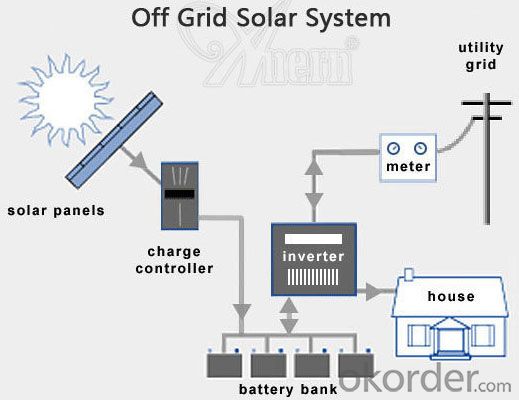
2. Off-Grid Features
1. Off grid solar power system is mainly used for application with relatively-small power consumption, and the areas have no grid network coverage, or grid power is unstable or outage condition.
2. It’s composed of solar panels, hybrid solar inverter, battery bank, solar panel mounting racks, and other accessories required fora complete home solar power system.
3. The battery bank gives a stable power output to the solar inverter which converts DC to AC to power loads, and provides power backup in rainy or cloudy days.
4. The solar panels generate electricity at daytime and charge the battery bank .
5. The off grid home solar power system provides grid power bypass in case of battery power shortage when sunshine is not enough.
6. All the off grid home solar power system configurations are worked out by scientific calculation and design.
The Product Parameter | |
Ref No. | 2KW |
Solar Panel | Type: Monocrystalline Silicon PV Module Max Power: 250W QTY:6 pcs |
Controller-Inverter Integrator | Rated Ouput Power: 2000W Rated DC Voltage: 48V QTY:1 pcs |
Battery | 12V/150AH per piece QTY:8 pcs |
Solar Panel Rack | Roof type mounting rack, anodized aluminum material, including complete fittings (Other type of racks can be customized as per client's requirement) QTY:1 pcs |
Cables | International standard, with specification suitable for solar system, RVV2*6 (20m), BV1*10 (20m) |
3.The Pictures of Product
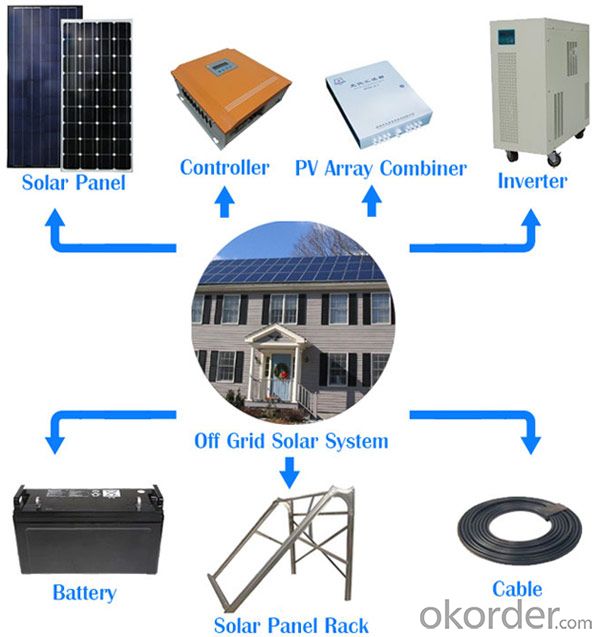
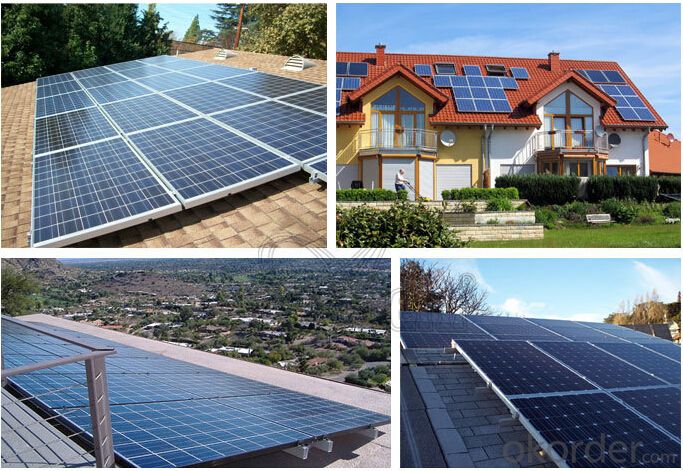
4.FAQ
Q1: What is the business type for the company?
A1: We are one of the biggest manufacturers inBejing.Chnia. Which is a high tech PV enterprise dedicated to the research, development, production and sales..
Q2: How long solar panel warranty can you offer?
A2: 10-Year product warranty,25-year linear power output warranty
If there is any quality problem, we will pay for freight and send free parts to you.
Q3: How many certificates do you have?
A3: We have 16 certificates,such as CE, TUV, UL, and so on.
Q4: Can I be the agent for you?
A4: Yes,We can discuss some information.
Q5: How to get a sample?How can cooperation with us
A5: contact us now.
- Q:Can solar energy systems be used to power agricultural operations?
- Yes, solar energy systems can be used to power agricultural operations. Solar panels can be installed on rooftops or open fields to capture sunlight and convert it into electricity. This renewable energy source can be used to power various agricultural operations such as irrigation systems, greenhouse lighting, machinery, and other electrical needs on farms. By utilizing solar energy, farmers can reduce their reliance on fossil fuels, lower operating costs, and contribute to a more sustainable and environmentally friendly agricultural industry.
- Q:Are there any health benefits associated with using solar energy?
- Yes, there are several health benefits associated with using solar energy. Firstly, solar energy production does not produce harmful greenhouse gases or air pollutants, resulting in cleaner air and a reduction in respiratory and cardiovascular diseases. Secondly, solar energy reduces the dependence on traditional fossil fuels, which are a major contributor to global warming and climate change, leading to improved public health outcomes. Additionally, the installation of solar panels can create job opportunities in the renewable energy sector, positively impacting economic and social well-being.
- Q:Can solar energy systems be integrated into building materials?
- Yes, solar energy systems can be integrated into building materials. This is known as building-integrated photovoltaics (BIPV), where solar panels or cells are seamlessly incorporated into various elements of a building, such as roofs, windows, and facades. BIPV allows for the generation of electricity while serving functional and aesthetic purposes, making it a sustainable and innovative solution for harnessing solar energy.
- Q:How do solar energy systems impact the health and well-being of communities?
- Solar energy systems have a positive impact on the health and well-being of communities in several ways. Firstly, they significantly reduce air pollution by replacing fossil fuel-based energy sources, leading to cleaner air and a decrease in respiratory diseases. Secondly, solar energy systems eliminate the need for hazardous materials like coal and oil, reducing the risks associated with mining and transportation accidents. Moreover, the increased availability of affordable and sustainable energy promotes economic development, improves access to healthcare, and enhances overall quality of life. Additionally, solar power generation creates job opportunities, contributing to the socio-economic well-being of communities. In summary, solar energy systems have a profound positive effect on community health, environmental sustainability, and overall well-being.
- Q:How does the efficiency of solar panels vary based on the temperature?
- Solar panels' efficiency is subject to variation depending on temperature. In general, solar panels perform better in cooler temperatures, but their efficiency declines as the temperature rises. This phenomenon is attributed to the materials used in solar panels, particularly semiconductor materials like silicon. As the temperature increases, the electrons in the semiconductor material gain more energy, resulting in a rise in the voltage output of the solar panel. However, this increase in voltage does not proportionally enhance the power output, leading to an overall decrease in efficiency. Furthermore, elevated temperatures can amplify the resistance of the electrical conductors within the solar panel, causing power losses and reduced efficiency. This is known as thermal losses. The heightened resistance impedes the flow of electric current, thereby diminishing the overall power output. In addition, high temperatures can trigger the "thermal runaway effect," a phenomenon where the efficiency of the solar panel rapidly declines as the temperature increases. This can pose significant challenges, particularly in regions with hot climates or during heatwaves. To counteract the adverse impact of temperature on solar panel efficiency, advanced solar panel designs incorporate cooling mechanisms. For instance, some panels are equipped with built-in ventilation systems or are elevated to facilitate air circulation underneath, ensuring dissipation of excess heat and maintenance of optimal operating temperatures. To sum up, solar panel efficiency is influenced by temperature fluctuations. While they perform better in cooler temperatures, their efficiency diminishes as the temperature rises due to increased resistance, thermal losses, and the thermal runaway effect. It is crucial to consider these factors during the design and installation of solar panels to maximize their performance and output.
- Q:What is concentrated solar power (CSP)?
- Concentrated solar power (CSP) is a renewable energy technology that uses mirrors or lenses to concentrate sunlight onto a small area, typically a receiver or a solar tower. This concentrated sunlight produces heat, which is then used to generate electricity through steam turbines or other heat engines. CSP systems can store energy for later use, making it a reliable and efficient source of power.
- Q:Are there any financial incentives for installing solar energy systems?
- Yes, there are several financial incentives available for installing solar energy systems. These incentives include federal tax credits, state and local rebates, grants, and loan programs. Additionally, installing solar panels can lead to long-term cost savings on electricity bills, as solar energy is renewable and reduces reliance on traditional energy sources.
- Q:Can solar energy systems be used in powering recycling plants or waste management facilities?
- Yes, solar energy systems can certainly be used to power recycling plants and waste management facilities. Solar panels can be installed on the roofs or in open spaces of such facilities to generate electricity from sunlight. This renewable energy source can help reduce reliance on fossil fuels and lower the carbon footprint of these operations. Additionally, solar energy can provide a stable and consistent power supply, contributing to the overall sustainability and efficiency of recycling plants and waste management facilities.
- Q:Can solar energy systems be used for powering electric vehicle research and development centers?
- Electric vehicle research and development centers can utilize solar energy systems for power. Solar energy, being a renewable and clean source, contributes to reducing the carbon footprint of these centers. The installation of solar panels on the rooftops or in open spaces allows the centers to harness solar energy and convert it into electricity for various operations. This approach not only provides sustainable energy but also lessens reliance on conventional electricity and fossil fuels. Moreover, the use of solar energy leads to long-term cost savings, as the initial investment in solar panels can be offset by reduced electricity bills. In conclusion, solar energy systems are a feasible and environmentally friendly choice for powering electric vehicle research and development centers.
- Q:What permits or approvals are required for installing a solar energy system?
- The permits and approvals required for installing a solar energy system may vary depending on the location and regulations of the specific jurisdiction. Generally, some common permits and approvals that might be required include building permits, electrical permits, zoning permits, and interconnection agreements with the local utility company. It is recommended to consult with local authorities or hire a professional installer who can guide you through the specific requirements in your area.
1. Manufacturer Overview |
|
|---|---|
| Location | |
| Year Established | |
| Annual Output Value | |
| Main Markets | |
| Company Certifications | |
2. Manufacturer Certificates |
|
|---|---|
| a) Certification Name | |
| Range | |
| Reference | |
| Validity Period | |
3. Manufacturer Capability |
|
|---|---|
| a)Trade Capacity | |
| Nearest Port | |
| Export Percentage | |
| No.of Employees in Trade Department | |
| Language Spoken: | |
| b)Factory Information | |
| Factory Size: | |
| No. of Production Lines | |
| Contract Manufacturing | |
| Product Price Range | |
Send your message to us
Off-Grid Solar Power System 2KW High Efficiency
- Loading Port:
- China main port
- Payment Terms:
- TT OR LC
- Min Order Qty:
- 1 pc
- Supply Capability:
- 10000 pc/month
OKorder Service Pledge
OKorder Financial Service
Similar products
New products
Hot products
Hot Searches
Related keywords
